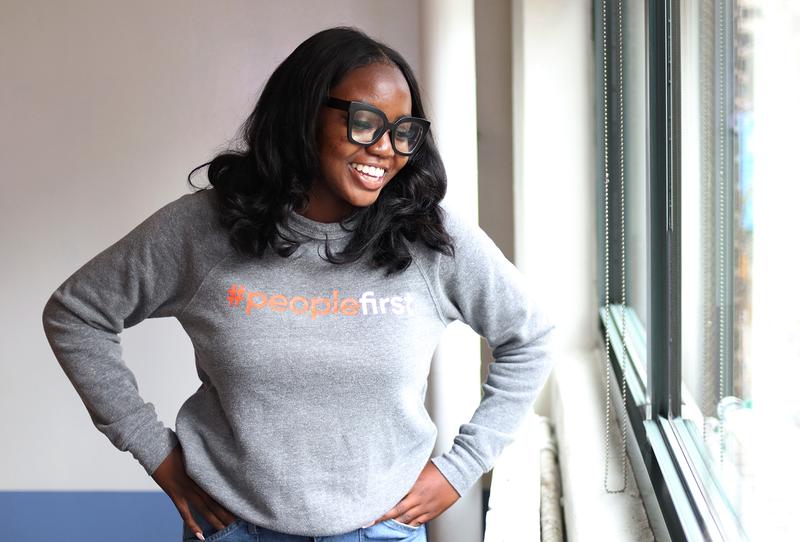Jamila Small: I remember being 10 years old and visiting my dad in prison. I hadn’t seen him in years. We were able to eat snacks together and talk. I can’t even tell you how long it was for. But it’s a memory that I hold very close. Growing up, I didn’t know any other kids who had a parent in prison. But a few years ago, I found out about a leadership program for teens with incarcerated parents. It’s part of the Osborne Association, which is a nonprofit that works with people affected by the criminal legal system. For the past four years, I’ve joined them on bus trips to Albany to advocate for a piece of legislation: The Protect In-Person Visits Bill.
Jamila speaking at a rally at the New York State Capitol building in Albany: We ask that you guys pass the bill to protect in-person visits.
Jamila: A lot of people’s first question is, what is this bill actually protecting? My friend Elijah Rodriguez explains it well.
Elijah Rodriguez: This bill allows you to maintain that personal touch, that relationship with — whether it might be your mother, your father, brother, sister, who’s unfortunately behind bars.
Jamila: This bill would protect visitation rights. It also mandates that facilities offer weekend or evening visits. The nonprofit advocacy group Prison Policy Initiative says hundreds of jails across the country have completely replaced in-person family visits with video visits. This is not a new trend — it’s been happening for more than a decade. But it is becoming more common. Elijah grew up visiting his step-dad in prison almost every week. His family would take a 12 hour bus ride, overnight, to make it upstate. He’s 16 now and he looks back on those weekends as a family tradition. I asked him what stood out to him most about those visits.
Elijah: His smile. His smile on his face and my smile. My mother’s smile. My siblings’ smile. It’s a beautiful sight to see that everyone is back together. Everyone’s happy.
Jamila: For Elijah, virtual visits can never replace the warmth of a hug or the joy of shared moments.
Elijah: When we would finish drinking our water from the water bottles, we would dampen a paper towel in there to make it a little heavier — but not, not too heavy. And we would go out in the yard and he would teach me how to play football. He would throw that empty water bottle around like it was a football and we would just seize the moment while we was there. We would enjoy the whole day.
Jamila: In Wisconsin, more than half of all jails have gotten rid of in-person visits. But some states have passed bills to protect in-person visits. In Massachusetts, video calls can be offered in addition to in-person visits. But they cannot replace them. We want our elected officials to pass similar protections in New York. Here’s Elijah again.
Elijah: It’s very different to know that I'm really just looking at a bunch of flat pixels on a screen. That I might be hearing him but I’m not there to actually give him a hug if I want to.
Jamila: Research shows maintaining family ties reduces the likelihood of re-incarceration. But virtual visits make connecting harder for families – not just emotionally. But also financially.
Jaiden Valentin: There is a major difference — for one, the pricing.
Jamila: That’s my friend Jaiden Valentin. He visits his dad – who’s in prison upstate – every few months. But he’s also done some virtual visits.
Jaiden: For online visits, you have to pay. We had to end up paying 15 dollars for a 30 minute call. That does not include the distractions that happen, the technical difficulties that occur.
Jamila. Prisons and jails contract with private companies to offer video calls, but the cost of the service is not regulated – and it can be high. Still, video calls are a great option —they just shouldn’t be the only option. That’s why I’m disappointed that the effort to protect in-person visits fell short in Albany this time around. Even though the bill passed in the senate, it never made it to a vote in the assembly. We’ll have to continue to meet with our elected officials to try to get them to see what we see: That our parents, our uncles, our brothers, our sisters, are still human. For us, this bill is about preserving our right to love and support them. For WNYC, I’m Radio Rookies reporter Jamila Small.
 Radio Rookies
Radio Rookies
